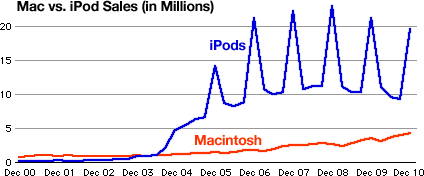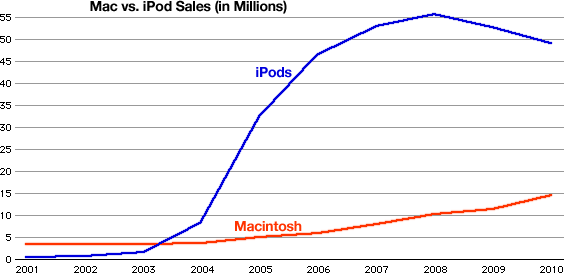We've all heard about the iPod "halo effect",
which has been used to explain the growth of Macintosh computer
sales.
It sounds plausible. People buy an iPod and decide they like it so
much that they buy a computer from Apple as well. Apple's Mac sales
have certainly improved since it started selling iPods in late 2001,
but are the two related?
When I collected sales data from Apple's financial statements, I was
amazed by how well the iPod has sold over the years. Every year we see
sales peak during the holiday quarter - and iPod sales nearly
double.
But when you compare the huge growth in iPod unit sales to the more
moderate growth in Macs, is there an obvious relation?

Quarterly Mac vs. iPod sales, Dec 2000 to Dec 2010
If all new iPod owners had even a small interest in Macs, that
should show up in the following years. But instead a Mac sales drop, as
you would expect after two years of iPod sales decline, they continue
to increase. Any interest sparked by being an iPod owner is spread out
over a long period of time and is either hidden or unimportant.
When showed this data to my family, my wife observed, "maybe after
buying an iPod, people didn't buy right away, but they went to look at
Macs." My daughter said, "Maybe they switched to play PC games using
VMware like my brother does." To this I agreed - these were important
factors - but both were made possible by two other changes at
Apple.

Annual Mac vs. iPod unit sales, 2001 to 2010
I feel that the switch to Intel processors made an important
breakthrough in selling Macs to the average PC users. I'm a Mac user at
home, but even I have wanted to use a Windows program on occasion. If I
were a PC user and owned a few programs, I would definitely want to
keep using them. Owning an Intel-based Mac has made that easy.
Further, the value equation for the Mac has improved. You may pay
more, but now you get the Mac software and an option to use almost any
PC software you want.
Unfortunately for this argument, the first Intel Mac came out in
the first quarter of 2006. We can see that Macs have been selling like
crazy since then, but that wasn't the start of the expansion.
The switch to Intel has accelerated the growth of the Mac, but
something else caused the initial growth spurt in 2005.
If my wife's suggestion that the iPod planted a seed of interest in
Apple computers, then the opportunity to realize that interest was made
possible by the retail innovation known as the Apple Store.
Before the Apple Store, there weren't a lot of good places to try
out a Mac. Hardly anyone had them at work. Most school districts were
switching over to PCs. CompUSA
sold them, but they were stuck in the back corner of the store and
mostly ignored.
The first Apple Stores opened
in May 2001. By the end of 2001, Apple had opened 21 stores. That was a
good start, but not quite enough to change the world. Lucky for Apple,
the Apple Store was an instant success, so Apple continued to open more
stores.
By the end of 2002, Apple had 51 stores. By the end of 2003, 73
stores, including one in Japan. The cumulative effect of the Apple
Store was going to be felt.
In a keynote
given by Ron Johnson, Apple Senior VP for Retail in April 2004, he
said, "well over 100 million people in the United States live within 15
miles of an Apple store". Apple had methodically covered
the US with stores, with a goal of reaching as many people as
possible.
By 2006 the NY
Times had this to say:
"The stores are crucial in turning Windows users into
Apple fans because they allow them essentially to test-drive machines,
with plenty of assistance from store personnel. The company says that
nearly half of the people buying Macintosh computers at Apple's stores
are converted Windows users."
The reality is that Apple has always had a strong brand. The need
for a halo effect to improve brand perception is less important than
having a platform for getting your products in front of the
consumer.
Maybe the iPod halo effect helped polish the Apple brand a little
more, but without the Apple Store it would have been meaningless.
Apple has made a lot of smart choices in the last ten years, but the
one most responsible for growth of the Mac has to be its retail stores.





